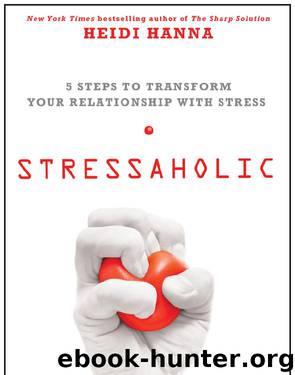Stressaholic by Heidi Hanna

Author:Heidi Hanna
Language: eng
Format: epub
Publisher: Wiley
Published: 2013-12-16T05:00:00+00:00
5. Sleep Enough, Nap as Needed
Although physical activity is critical to keeping oxygen and glucose circulating throughout the day, at times we need to simply rest. We have a serious sleep problem in this country, as well as across the globe. According to recent studies, approximately 70 million Americans are affected by chronic sleep loss or sleep disorders. The annual cost of chronic sleep loss is estimated at $16 billion in health care expenses and $50 billion in lost productivity.6
A lack of sleep puts your body under additional stress, which may trigger increases in adrenaline, cortisol, and other stress hormones during the day. Your body is not able to undergo the proper recovery cycles when you fail to get adequate sleep. This means that you miss the opportunity for your blood pressure to dip during the evening. This may negatively affect your heart and vascular system by increasing C-reactive protein, which is released when there is inflammation in the body and has been shown to increase the risk of developing heart disease. Too little sleep also compromises immune functioning, because you fail to produce the necessary hormones and other molecules you need to fight off infection.
Sleep is not just about giving your system a rest. It is also when your body and brain do some of their most important work to repair and rebuild muscle tissue and strengthen neural connections that improve learning and memory. The area of the brain that may be most affected by sleep, or lack of it, is the prefrontal cortex, the part that's responsible for executive functioning processes such as learning, judgment, reasoning, memory consolidation, and understanding.
Sleep deprivation and sleepiness have adverse effects on performance, response times, accuracy, attention, and concentration. Lack of quality sleep has been associated with a range of quality-of-life measures, such as social functioning, mental and physical health, and even early death. It's also been correlated with obesity, increases in smoking and alcohol use, inactivity, inflammation and heart disease, and blood sugar imbalances.7
Most people are well aware that they should be getting more sleep but fail to make it a priority because there are so many other things they could or should be getting done. Like the scenario I described in the Introduction, we convince ourselves we'll just do one more thing before bed. Then, before we know it, hours slip by mindlessly, and sleeplessly. To get the adequate sleep we need to fully rest, it's important that we make bedtime a priority, try to stick with a consistent routine, and establish bedtime rituals that support a better quality of sleep once we get there.
Although some activities can assist you in falling and staying asleep long enough to feel rested, there are others that you should avoid before bedtime. Here are a few tips for sleeping well:
Go to bed early. Some studies suggest that early to bed and early to rise is more suited to our natural rhythms.
Don't toss and turn. If you have trouble falling asleep, don't just lie there. Do something relaxing until you feel sleepy.
Download
This site does not store any files on its server. We only index and link to content provided by other sites. Please contact the content providers to delete copyright contents if any and email us, we'll remove relevant links or contents immediately.
Pioneering Portfolio Management by David F. Swensen(6278)
Man-made Catastrophes and Risk Information Concealment by Dmitry Chernov & Didier Sornette(5996)
Zero to One by Peter Thiel(5779)
The Motivation Myth by Jeff Haden(5201)
The Miracle Morning by Hal Elrod(4699)
Elon Musk by Ashlee Vance(4118)
The Art of Persistence: Stop Quitting, Ignore Shiny Objects and Climb Your Way to Success by Michal Stawicki(3642)
Unlabel: Selling You Without Selling Out by Marc Ecko(3642)
Delivering Happiness by Tony Hsieh(3412)
Urban Outlaw by Magnus Walker(3388)
Purple Cow by Seth Godin(3188)
The Marketing Plan Handbook: Develop Big-Picture Marketing Plans for Pennies on the Dollar by Robert W. Bly(3036)
Mastering Bitcoin: Programming the Open Blockchain by Andreas M. Antonopoulos(3033)
The Power of Broke by Daymond John(2958)
The Content Trap by Bharat Anand(2912)
Applied Empathy by Michael Ventura(2885)
The Airbnb Story by Leigh Gallagher(2835)
Keep Going by Austin Kleon(2753)
Radical Candor by Kim Scott(2709)
